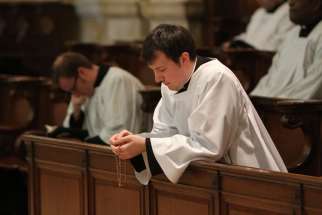God’s mercy allows us to repent
Fourth Sunday of Easter (Year A) May 11 (Acts 2:14a, 36b-41; Psalm 23; 1 Peter 2:20b-25; John 10:1-10)
Peter’s words rolled across the crowd like the voice of doom. They were thunderstruck at his message: somehow they had crucified the one whom God had designated as Lord and Messiah.
God’s quiet presence in our life
The 12th-century Persian poet Rumi submits that we live with a deep secret that sometimes we know, and then not.
WASHINGTON - Director Darren Aronofsky says he is not religious, and that his Russell Crowe blockbuster movie Noah is the “least-biblical biblical film ever made.”
Chesterton debates live on
TORONTO - The spirit of Catholic apologist and author G.K. Chesterton will inspire debate once again in the Archdiocese of Toronto.
Advent is time to renew faith, bring God's love to others, pope says
VATICAN CITY - Advent's liturgical preparation for Christmas calls Christians to renew their faith in the reality of God's great love and to make a commitment to bringing his love to the world today, Pope Benedict XVI said.
Artist couple glorifies God through art
CALGARY - Newlyweds Christopher and Jacinta Pecora met in 2008 at a friend’s pork roast. They hit it off after discovering their mutual interest in art, and their common Catholic faith solidified the connection.
Chris is a graphic designer and Jacinta is a print maker. This past summer, the 25-year-olds were married, a union filled with a love of art and strengthened by their mutual God-given artistic talents.
Both grew up creating art and pursued these passions in post-secondary education. Chris studied graphic design at the University of Lethbridge and Jacinta studied fine arts at the University of Calgary.
Art is “part of who we are, it’s a similarity that we can share, along with our faith,” Jacinta said.
Now that they are young professionals, they have begun to use their talents for the good of others and the Church.
Chris recently started his own graphic design company. At Chris Pecora Graphic Design, his clients are as diverse as a bike shop in San Francisco to a coffee company in Calgary. He also has a number of Catholic clients. He designs posters, graphics and logos for clients such as the diocese of Calgary, Catholic Christian Outreach and Clearwater Academy, a private Catholic school in Calgary.
But Chris finds that many Catholic organizations don’t prioritize on graphic design, so he ensures that he brands his designs in such a way that they appeal to Catholics and non-Catholics alike. By creating posters, ads and web sites that look both artistic and modern, Chris is able to endow these organizations with a competitive edge. For example, he designed promotional posters for FaithLife Conferences that happen every two months in the Calgary diocese. These eye-catching posters show what the conference is about without a preachy feeling.
Chris attributes his success to God.
“I feel like God is allowing me to do this,” he said. “I trust that what I’m making is from God.”
Chris thanks divine inspiration for his work.
“(The idea) starts as something from me and then working through it, suddenly these things that are way smarter than me kind of just appear.”
Jacinta, instead of working with organizations, works with individuals. As a facilitator at Prospect, a human services organization in Calgary, she teaches adults with developmental disabilities different forms of art such as painting, printmaking, sculpture, photography and drawing. She is required to look for moments throughout the day to help teach her students life skills and set goals so they can eventually be employed.
Jacinta turns to the grace of God to help her be patient with the sometimes-challenging behaviours that her clients exhibit.
“It’s not a daily struggle for me to go through my day, whereas for some of them it’s a physical struggle or for some of them it’s a mental struggle,” she said.
In turn, her students teach her to be more appreciative of her life.
“I am grateful for what God has blessed me with,” she said.
In pursuing her own art, Jacinta allows God to inspire and direct her.
“I get really nervous every time I make something. Every new project is a little bit intimidating,” she said. So she prays. “If I didn’t, I would be so nervous I wouldn’t be able to do it.”
Jacinta’s medium is a traditional form of printmaking called etching. She creates art to express herself and experiences she has had.
The fact that both she and her husband are artists helps them to understand and encourage each other in a deeper way, with both their art and their faith.
Two years ago, Jacinta worked with the Sisters of Charity in Calcutta. They inspired her to create prints based on this experience, and Chris encouraged her with ideas on how to create significant art from this faith-based trip.
The couple also create art together to inspire others, and their collaboration brings them closer together. To a close friend of theirs who recently was ordained to the priesthood, Chris and Jacinta gave a quote from Pope Benedict XVI burnt into wood.
“It makes the whole process of creating less daunting just to know that I have someone I can talk to about these ideas,” Chris said, “because art is a very personal thing, you have to be vulnerable, but I have my wife and I can tell her.”
For both Christopher and Jacinta, the type of work they do is dictated by their faith.
“I’ve turned down work that is not in line with my faith, if what the client is asking me to do isn’t really congruent with my beliefs,” Chris said.
“We can have these discussions so that things that we create would never go against our morals, and we can support each other in that,” said Jacinta.
They are working in the world, but according to Jacinta their mutual understanding and faith “keeps us accountable and in check about how we want to live and have people see our work.”
They keep in mind the letter Pope John Paul II wrote to artists in 1999.
“(Our work) should always glorify God one way or another,” Chris said paraphrasing the Pope. “It is a positive, hopeful Catholic perspective.”
The letter also states that God created man and woman in His own image, for each other, and then sent them to create not only in the familial sense, but also in the other vocations they are called to. So through their work with Catholic and humanitarian organizations, Chris and Jacinta abide by John Paul II’s request to “not to waste this talent but to develop it, in order to put it at the service of their neighbour and of humanity as a whole.”
God should be at our very core
31st Sunday in Ordinary Time (Year B) Nov. 4 (Deuteronomy 6:2-6; Psalm 18; Hebrews 7:23-28; Mark 12:28-34)
A covenant is an unbreakable relationship, not an arrangement of convenience. It is characterized by loyalty, commitment, patience, forgiveness and, above all, love. In fact, all of those qualities are variations on the theme of love.
Modern culture has a great difficulty with commitment and loyalty, and yet it is the foundation of all genuine relationships. God’s covenant with Israel was permanent even though this relationship was definitely rocky, with its moments of glory as well as degradation. Human weakness is always with us, and all relationships, be they marriages, friendships or religious commitments, have periods of struggle and failure. Two things must be remembered: God never let Israel down, even when they brought disaster on their heads, and always granted new life and restoration. Secondly, the way that God blessed Israel was reciprocated by their fierce loyalty and love. The reading from Deuteronomy contains the shema — Hear, O Israel — that is and always has been the very heart and essence of Israel’s faith. It is a call and communal commitment to love God with all of one’s being. God is not to be treated as a concept, idea, convenience, stopgap or part-time consultant. Rather than a compartmentalized life one’s mind, heart, soul and all areas of human activity are to be centred on God.
Covenantal loyalty included loyalty to one another and to the community, as well as a commitment to serve and care for those who were weak, vulnerable or poor. Israel’s covenantal loyalty was not easy, especially when surrounded by competing claims and diverse forms of worship. This loyalty is still problematic in our own time and culture. Countless allurements compete for our affections and attention and threaten to lure us away from a wholehearted commitment to God. There are many things that seem
more glamourous or immediately useful. Sometimes the offending obstacle is nothing more than stress, worry and preoccupation with daily affairs. To sum up: for the people of God, faith and love of God were not something done in the head but with the whole person. There is no proper place for God in our lives but the very core and centre.
Covenants are always on shaky ground when human beings are involved for mortals often disappoint and wound. This was the case in ancient Israel and it has been so in the Christian Church. That is the bad news, but the author of Hebrews offers us a huge consolation. Our covenant is mediated by one who does not disappoint or wound and is not subject to the flaws and weaknesses that are so much part of our own experience. Jesus is our priest forever — He does not change and He is not going anywhere. He is the one who helps us on our journey with compassion and understanding, as well as interceding with the Father on our behalf. We are not alone nor have we ever been abandoned.
Love of God and neighbour is the golden thread that unites both testaments of the Bible. It is also the dynamism that urges salvation history onward. When the earnest scribe asked Jesus to identify which of the commandments was the greatest, Jesus merely repeated Israel’s “creed” — the shema. There was no need to make up something new. For clarity and emphasis he added another line from the tradition of Israel — from Leviticus — “your neighbour as yourself.” This was a very quick and spiritually perceptive scribe — he understood Jesus immediately.
Recognizing the absolute oneness of God and being devoted to Him above all and loving one’s neighbour as oneself is the essence of all revealed religions. Devotions, liturgies and religious gestures are of little use if these essential elements are missing. Jesus confirmed His insights by recognizing that He was not far from the Kingdom of God — living as a God-filled and inspired person. The brightest light that we could possibly bear within our minds and hearts is this great commandment. It will illuminate and transform our interactions with others and our daily activities, and in an age of much religious controversy, it will bring us together in what matters most. Loving God in the manner urged by the great commandment implies that we also love all that God loves — all creation and humanity without distinction or conditions.






